In this unit you will learn practical phrases related to travelling, how to say what time it is, numbers from 0 to 100, some prepositions, irregular verbs and pronunciation. Enjoy
A) Dialogo alla stazione ferroviaria / At the train station
Read the conversation
| Cliente: | Scusi, quando parte il treno per Roma, per favore? |
| Impiegato: | Fra mezz´ora. |
| Cliente: | Da che binario? |
| Impiegato: | Dal binario tre. |
| Cliente: | Devo cambiare o è il treno diretto? |
| Impiegato: | Non deve cambiare. |
| Cliente: | Un´andata e ritorno per Roma, quanto costa? |
| Impiegato: | 15 euro. |
| Cliente: | Un´andate e ritorno per Roma, per favore. |
| Impiegato: | EccoLe. A proposito, prima di salire sul treno deve convalidare il biglietto. |
| Cliente: | Grazie, arrivederci. |
| Impiegato: | Arrivederci e buon viaggio. |
Parole chiave / Key words
Listen and repeat
| in macchina / in treno / in bici / in filobus | by car / by train / by bicycle / by trolleybus |
| la stazione | the station |
| alla stazione ferroviaria | at the train station |
| la fermata | the bus stop |
| vado a piedi | I walk / I go on foot |
| un‘ andata e ritorno | a return ticket |
| un´andata | a single ticket |
| convalidare il biglietto | to punch a ticket |
| Quanto è? / Quant´è? / Quanto costa? | How much is it? |
| A che ora?, Che ora è? | What time?, What time is it? |
| Fra mezz‘ ora / fra quindici minuti | in half an hour / in fifteen minutes |
| eccoLe | Here you are |
| A proposito | By the way |
B) Verbi / Verbs
Listen and repeat
| verbi | verbs |
| scendere dal treno | to get off the train |
| salire sul treno | to get on the train |
| dovere | to have to |
| volere | to want |
| potere | can |
Verbi irregolari / Irregular verbs
Listen and repeat
| volere | to want | potere | can |
| voglio | I want | posso | I can |
| vuoi (one person) | you want | puoi | you can |
| vuole | he / she wants | può | he / she can |
| vogliamo | we want | possiamo | we can |
| volete (more people) | you want | potete | you can |
| vogliono | they want | possono | they can |
| dovere | to have to | salire | to get on |
| devo | I have to | salgo | I get on |
| devi (one person) | you have to | sali (one person) | you get on |
| deve | he / she has to | sale | he / she gets on |
| dobbiamo | we have to | saliamo | we ge on |
| dovete (more people) | you have to | salite (more people) | you get on |
| devono | they have to | salgono | they get on |
C) Che ora è? = Che ore sono? / What´s the time?
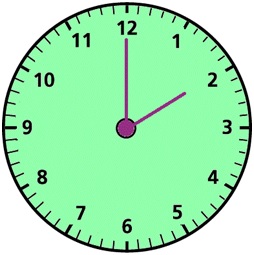 sono le due |
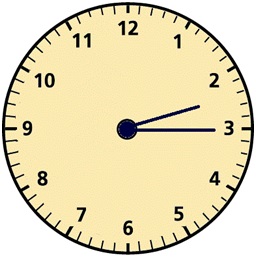 sono le due e un quarto |
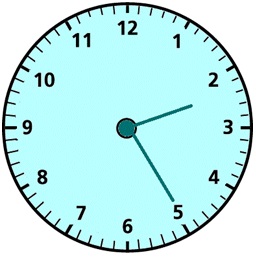 sono le due e venticinque (minuti) |
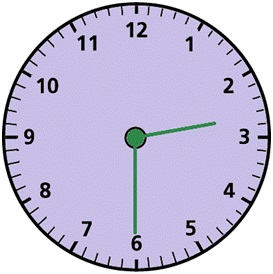 sono le due e mezza |
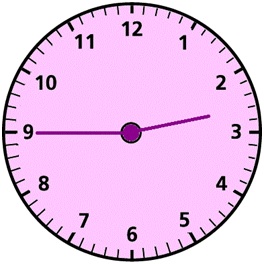 sono le tre meno un quarto |
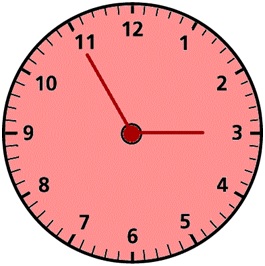 sono le tre meno cinque |
preposizioni / prepositions
| A che ora ? | What time ? | A che ora torni ? | What time are you coming back? |
| alle | at | Torno alle due. | I am coming back at two o’clock. |
| dalle … alle | from … to | Studio dalle 6.00 alle 7.00. | I study from 6.00 to 7.00 |
| fra / tra | in | Torno fra due giorni. | I will be back in two days. |
| verso | at about | Tornano verso le 7.00. | They are coming back at about 7.00. |
| dopo | after | Torno a casa dopo le sei. | I come back after six. |
| prima delle | before | Devi tornare prima delle dieci. | You have to be back before ten. |
notes: |
the definite article le (or l´- with "una") is always used (because le ore is feminine plural) |
it is not necessary to use the word "minutes" |
it is also possible to tell the time in digital form: sono le quattordici e quindici (14:15), especially in official and public contexts |
the word ore is used only (mostly) in official and formal situations, like invitations or official announcements: La festa comincia alle ore sette. |
it is also possible to say mezzo instead of mezza, but mezza is correct (because mezza ora - feminine) |
un is always used with quarto |
at midnight - a mezzanotte |
at midday - a mezzogiorno |
D) Numeri da 0 a 100 / Numbers from 0 to 100
Listen and repeat
| 0 zero | 1 uno | 2 due | 3 tre | 4 quattro | 5 cinque |
| 6 sei | 7 sette | 8 otto | 9 nove | 10 diece | 11 undici |
| 12 dodici | 13 tredci | 14 quattordici | 15 quindici | 16 sedici | 17 diciassette |
| 18 diciotto | 19 diciannove | 20 venti | 21 ventuno | 22 ventidue | 23 ventitré |
| 28 ventotto | 30 trenta | 31 trentuno | 33 trentatré | 38 trentotto | 40 quaranta |
| 50 cinquanta | 60 sessanta | 70 settanta | 80 ottanta | 90 novanta | 100 cento |
Notes: |
they do not change their form: sei libri, diciottto giorni (with the exception of uno:un ragazzo, uno studente, una nave) |
they precede the noun: cinque ragazzi, ventidue persone |
they are written as one word, e.g. ventidue, ecc. |
tre is written without an accent but as the final element of numerals it is written with an accent because it carries word stress |
the final vowel ofventi and of numerals ending in -anta is deleted when followed by numerals uno or otto |
never ventiuno but ventuno |
E) Come pronunciare e scrivere: lettere s, ss / How to pronounce and write: letters s, ss
Listen and repeat
| letters | pronunciation | examples | English translation | /s/ in English word |
| S SS |
/s/ at the beginning of a word before vowels and before unvoiced consonants | SANO SETTIMANA SPORCO STREGA PRESSO |
HEALTHY WEEK DIRTY WITCH NEAR |
SIT |
| letters | pronunciation | examples | English translation | /z/ in English word |
| S | /z/ before voiced consonants and between vowels (there are some exceptions) | SNELLO SLITTA SVENIRE CHIESA |
SLIM SLED FAINT CHURCH |
ZERO |
image sources
- 3-travel-train-unit: Freepik
